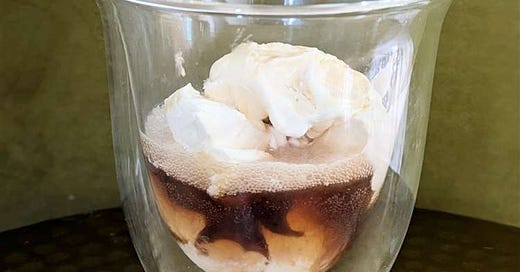I took liberties with the classic Italian Affogato, replacing the espresso with beer in my January recipe column for Suffolk News. Here are some of my thoughts on the process and links to the books, articles and research I found helpful.
This column’s nub- the reaction of the media and (some) viewers to a recipe of Nigella Lawson’s- completely took over. It had niggled at me ever since the TV series in question, Simply Nigella aired in 2015, but I didn’t intend the entire column to be about her. When in writing mode, I usually go for a walk and draft the entire piece in my head before returning home to ‘download’ it onto the screen. This time, I sat down and tried to write my column from the top, and the nub took on a life of its own. A lot got deleted: thoughts about Rationalism versus Empiricism, the concept of absolute knowledge, Meta-Rationality, and theoretical and practical rationality as applied to the process of writing a recipe felt too self-indulgent or pretentious for a recipe column in a regional newspaper. if I am being honest, I felt a bit insecure about my philosophical rambling being released into the wild (I still do!) A paragraph about Affogato’s somewhat amorphous origins and some notes on beer and coffee were also cut because the world does not need yet another food writer pontificating about Affogato’s vague origin story.
My column wasn’t the place to explore the limitations of conceptualising a recipe as a ‘rationale in itself’ (i.e. an explanation of influencing principles of opinion, belief, practice, or phenomena -or, in plain English- a set of reasons upon which an action or decision is based). Neither was it appropriate to discuss Meta-Rationality’s role in mitigating these limitations. But if you think of it as a form of reflective and reflexive practice, it seems clear that Lawson does not take the recipe (the rational system) for granted but instead chooses to reflect on how it works in practice and how she might challenge its boundaries in response to the experience of the people who cook from her books. The feedback they offer about their experiences cooking her recipes provides the outside perspective critical to Meta-Rationality.
Essential reading:
The Gastronomy of Italy by Anna Del Conte.
Nigellissima by Nigella Lawson
Nikki Segit’s Flavour Thesaurus is endlessly helpful on the subject of flavour pairings.
The Beer Kitchen: The Art and Science of Cooking and Pairing with Beer by Melissa Cole is an excellent general primer on the subject.
Back in 2014, Rachel Roddy wrote about the affogato.: “The effect of pale and dark, of hot meeting cold, of sweet and lactic meeting a full, tannic espresso is fantastic and one of my favourite ways to end a meal.”
Morwenna Ferrier writes about necessity as the mother of invention and creativity in the face of a vanilla crisis. Custardo versus affogato? You decide.
Austa Somwichian-Klausen on the history of affogato via Thrillist.
Tantri Wija writes about the ‘serious history’ behind chocolate beers’ for The Seattle Times.
Mike Reis for Serious Eats on how to pair beer and dessert.
Reasonable Instruction Use versus Rational Procedure uses computer programming, the construction of flatpack furniture and recipe writing to examine how instruction works. I have many thoughts about this series of posts.
David Chapman on meta-rationality and how it usefully mediates the pitfalls inherent within rationality.
I’d like to write more about how Rationalism can reduce the space within which diasporic, transnational and transregional culinary traditions form and flourish, impairing the creation of a ‘plethora of interpretations’, described by Lawson in her rebuttal of the argument that classic recipes should not be altered. (Oral traditions in the passing on of recipes are particularly vulnerable.) But that is for another time and newsletter.
Post-publication, what changes might I make to my copy? I’d make it clear that cooks need to use a beer with solid chocolate and coffee notes to reflect the espresso used in the original method. In my recipe instructions, I say ‘beer’ because of an assumption that readers would know to use the beers discussed in the headnotes. Never assume. The body of the essay could also use a little more information about the pairing of beer with gelato.
(Links to books mentioned are affiliated to Bookstore.Org. I will earn a small commission should you buy from them. )






this would do well with a good chocoate Stout
Oh these are my favorite kinds of things to read. Some deep thoughts & loads of links to explore on them. Thank you!